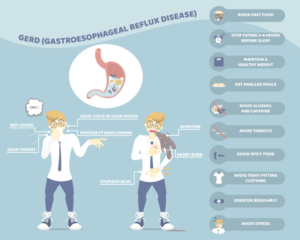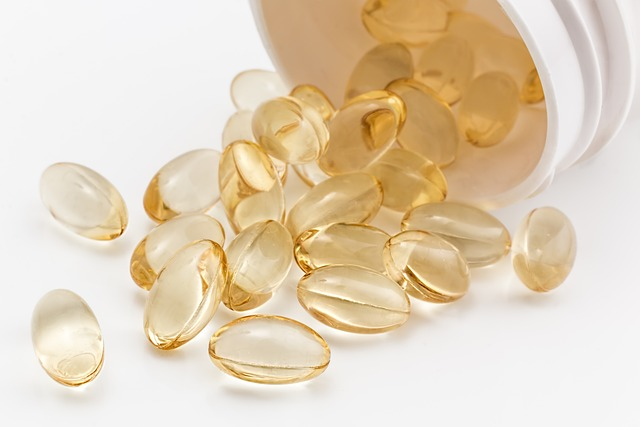Dr. Matthew Olesiak continues to make a significant impact in the medical field through his work at SANESolution and his dedication to evidence-based practices.
Managing Acid Reflux
Managing acid reflux can be a walk in the park or super complex.
Are you suffering from a burning sensation in your chest or throat and constantly feeling uneasy after meals? You might be experiencing acid reflux or gastroesophageal reflux disease (GERD). With approximately 20% of the U.S. population affected by GERD, you are not alone in this struggle. In this throat cleaner and remedies blog post, you’ll find a comprehensive guide on managing acid reflux, including understanding its symptoms and causes, exploring treatment options, and discovering effective remedies for relief. If you need other g reat remedies for your throat, make sure to check out our benefits of steam inhalation and benefits of honey and lemon articles!
Let’s dive in and help you find the relief you seek.

- New Report Says Your Brain Could Be the Key to Reducing Phlegm Over 50
- Doctor's "Leave The Throat Phlegm Behind" Tutorial Goes Viral With People Over 50
- Can You Relieve Throat Phlegm and Coughing In 60 Seconds A Day? This Doctor Says Yes
- How To Banish Phlegm When 50+ (Do This Every Day)
Short Summary
- Recognize risk factors, symptoms, and treatments for GERD.
- Make lifestyle changes such as weight loss, dietary adjustments with Throat Cleaner on board, and sleep position modifications to manage acid reflux discomfort.
- Consult a healthcare professional if symptoms occur frequently or don’t improve with lifestyle changes & medications.
Understand Managing Acid Reflux
Acid reflux is a condition where stomach acid flows back into the esophagus, causing irritation and discomfort. Gastroesophageal reflux disease (GERD) is a chronic form of acid reflux characterized by frequent occurrences of this reflux. The primary cause of acid reflux is the weakening or relaxation of the lower esophageal sphincter (valve), which leads to increased acid production in the stomach. Certain risk factors, such as obesity and the presence of a hiatal hernia, make some individuals more prone to developing GERD. GERD can affect people of any age, but the probability of experiencing some form of GERD (mild or severe) increases after the age of 40.
Several tests are available for diagnosing GERD, such as an X-ray of the upper digestive system, an upper endoscopy, and an ambulatory acid (pH) probe test. Once diagnosed, a healthcare professional may prescribe a medication regimen that includes proton pump inhibitors to manage the condition.

Explanatory Text
GERD (Gastroesophageal Reflux Disease)
Symptoms of GERD: dry cough, sour throat, sour taste in your mouth, difficulty swallowing, vomiting, heart burn, stomach ache.
Ways to prevent GERD: avoid fast food, stop eating three to four hours before sleep, maintain a healthy weight, eat smaller meals, avoid alcohol and caffeine, avoid tobacco, avoid spicy food, avoid tight-fitting clothing, exercise regularly, avoid stress.
End Explanatory Text
Recognizing GERD Symptoms
Recognizing the symptoms of GERD is the first step towards managing the condition, which is one of the digestive and kidney diseases. Common symptoms include heartburn, acid indigestion, regurgitation, chest pain, difficulty swallowing, and hoarseness. Diagnosing and treating GERD involves tests like endoscopy, pH monitoring, and esophageal manometry. It is important to note that infants and children can also experience mild symptoms associated with GERD and kidney diseases, such as heartburn and regurgitation.
Interestingly, research has found a correlation between GERD and asthma, with over 75% of those with asthma having GERD. This makes them twice as likely to have GERD compared to those without asthma. Avoiding fatty foods may help reduce GERD symptoms in these individuals.
Lifestyle Changes for Managing Acid Reflux
Lifestyle changes play a significant role in managing acid reflux symptoms. In the following subsections, we will explore the benefits of weight loss, dietary adjustments, and sleep position modifications in reducing the discomfort associated with acid reflux.
Losing excess pounds can help you lose weight and reduce the pressure on the lower esophageal sphincter.
Weight Loss and GERD
Losing weight can help reduce pressure on the stomach and lower esophageal sphincter, helping to prevent acid reflux. Research has shown that even modest weight loss can have a significant impact on GERD symptoms. In women, a weight loss of 5-10% can lead to a significant reduction in GERD symptom scores, while in men, a significant improvement in GERD symptom scores can be observed after a weight loss of 10% of baseline body weight.
These findings highlight the importance of weight loss in managing GERD. To achieve the desired weight loss, it is recommended to follow a healthy diet and engage in regular exercise.
Dietary Adjustments
Diet plays a crucial role in controlling GERD symptoms. Consuming smaller meals, abstaining from certain foods and beverages, and avoiding eating late at night may be advantageous for managing acid reflux symptoms. Some trigger foods that may cause the onset of GERD symptoms include chocolate, coffee, fried foods, peppermint, spicy foods, and carbonated beverages.
Adopting a diet rich in:
- whole grains
- fruits
- vegetables
- healthy fats
By making these dietary adjustments, you can relieve mild symptoms, reduce the frequency and severity of GERD symptoms, and improve your overall well-being.
Sleep Position and Timing
Your sleep position can significantly influence the intensity of GERD symptoms. Here are some recommendations.
- Elevate the head during sleep
- Refrain from lying down shortly after eating
- Sleep on your left side, as it has been proven to reduce the pressure on the lower esophageal sphincter.
Avoiding lying down soon after eating is also important, as it can cause the stomach contents to press against the lower esophageal sphincter, resulting in acid reflux. By making these adjustments to your sleep position and timing, you can significantly reduce the discomfort associated with acid reflux.
Medications for GERD Relief

For those who continue to experience GERD symptoms despite lifestyle changes, medications can provide relief. Over-the-counter antacids and prescription proton pump inhibitors are available to help manage GERD symptoms. Antacids can be purchased without a prescription and are effective in neutralizing stomach acid, while a proton pump inhibitor works by reducing acid production.
In cases where over-the-counter medications are not effective, a healthcare professional may prescribe a prescription-strength drug to help manage GERD symptoms. It is essential to consult a healthcare professional if you fail to experience relief within a few weeks, as this may indicate the need for stronger medication or alternative treatment options.
Alternative Therapies for Acid Reflux
While alternative therapies, such as ginger root, melatonin, and aloe vera, may provide some relief for acid reflux, their effectiveness in treating GERD is not proven. It’s important to remember that these therapies are not a substitute for medical treatment and should be used in conjunction with lifestyle changes and medication, as prescribed by a healthcare professional.
Herbal remedies like ginger, chamomile, and slippery elm may provide temporary relief for acid reflux. However, it is essential to note that there is no evidence to suggest that alternative therapies can treat GERD or reverse damage to the esophagus. Always consult your healthcare professional before trying any alternative therapies.
Surgical Options for Severe GERD
In cases of severe GERD, when lifestyle changes and medications do not provide adequate relief, surgery may be considered as a possible option. Surgical procedures, such as transoral incisionless fundoplication (TIF) or weight-loss surgery, may be recommended to help manage severe GERD symptoms.
Transoral Incisionless Fundoplication (TIF) is a procedure that tightens the lower esophageal sphincter. It is done by creating a partial wrap around the lower esophagus using polypropylene fasteners. TIF offers rapid recovery time and a high degree of tolerance, making it a viable option for those who have not found relief through other treatments.
Pediatric GERD: Symptoms, Diagnosis, and Treatment

Pediatric GERD can present similar symptoms to adult GERD, including:
- vomiting
- gagging
- coughing
- difficulty in breathing
- heartburn
- bad breath
- nausea
- abdominal discomfort
In some cases, hospitalization might be required if the child experiences severe complications due to GERD.
Treatment options for pediatric GERD may include medications, dietary modifications, and in extreme situations, surgery. It is crucial to consult a healthcare professional if your child is experiencing symptoms of GERD to ensure proper diagnosis and treatment.
When to Consult a Healthcare Professional
It’s essential to consult a healthcare professional if acid reflux symptoms occur frequently or persist despite lifestyle changes and over-the-counter medications. A gastroenterologist, a specialist in digestive disorders, may be the appropriate healthcare professional to consult in cases of GERD.
If you have experienced acid reflux or heartburn more than twice a week over an extended period, and have been using heartburn and antacids regularly, yet your symptoms persist, it is advisable to contact your healthcare provider for further evaluation and treatment.
Summary
In conclusion, managing acid reflux and GERD involves understanding their causes and symptoms, adopting lifestyle changes such as weight loss, dietary adjustments, and sleep position modifications, and utilizing medications or alternative therapies for relief. In severe cases, surgical options may be considered. Remember, it is crucial to consult a healthcare professional if symptoms persist or worsen. With the right approach, you can effectively manage acid reflux and GERD and lead a more comfortable and healthy life.
Frequently Asked Questions
What soothes acid reflux immediately?
For immediate relief from acid reflux, try a home remedy like baking soda or an over-the-counter antacid. Make sure to follow the instructions on the antacid’s packaging, and keep in mind that baking soda may have a bitter taste.
What foods neutralize stomach acid?
Oatmeal can help absorb stomach acid, and foods like bananas may be less likely to trigger it.
Is drinking water good for acid reflux?
Drinking tap or filtered water a little while after a meal can help reduce acidity and reduce GERD symptoms, as it will dilute the pockets of high acidity found just below the esophagus.
Therefore, drinking water can be beneficial for acid reflux.
What is the difference between acid reflux and GERD?
Acid reflux is a one-time occurrence of stomach acid flowing back into the esophagus, whereas GERD is a chronic form that is more frequent and severe.
What are the common symptoms of GERD?
Common symptoms of GERD include heartburn, acid indigestion, regurgitation, chest pain, difficulty swallowing, and hoarseness.

Dr. Matthew Olesiak continues to make a significant impact in the medical field through his work at SANESolution and his dedication to evidence-based practices.



